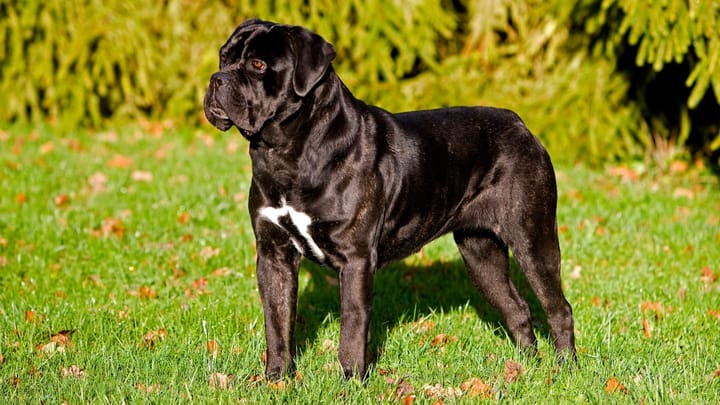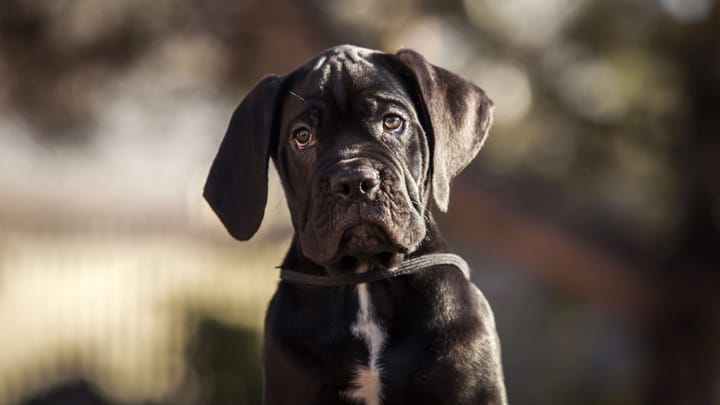Cane Corso
Other names : Italian Mastiff, Can Corso Mastiff, Cane Corso Italiano, Italiano Molosso


Very attached to and protective of his social group while not being too clingy, the Cane Corso is an excellent watchdog. Calm and well-balanced, this Italian dog is the perfect companion. Both observant and intelligent, it takes quite a lot for this pet to feel at ease and he will need to take his time to judge the safety of a person or situation.
|
Life expectancy |
The Cane Corso has a life expectancy of between 10 and 11 years |
|
Temperament |
|
|
Size |
Large
|
|
Adult size |
Female
Between 23 and 25 in
Male
Between 24 and 27 in
|
|
Adult weight |
Female
Between 88 and 99 lb
Male
Between 97 and 110 lb
|
|
Coat colour
The Cane Corso’s fur can be a variety of colours: black, steel grey, slate, light grey, light fawn, dark fawn or brindle (markings on fawn or grey). |
Black Blue |
|
Type of coat
The fur is short. The Italian Mastiff’s coat is shiny, with a dense outer coat and light undercoat. |
Short |
|
Eye colour
The eyes are generally aligned with his fur colour. They should always be very dark. |
Brown
|
|
Purchase price |
The Cane Corso costs approximately 1110£ |
Many dogs with droopy eyes (Cane Corso, Bulldog, etc.) have problems relating to the Harderian gland (a lacrimal gland) as they’re growing up. This gland can swell up and get inflamed as it develops faster than the puppy’s head. It would then be necessary to go to see a vet, but this condition is still manageable.
More details about the Cane Corso
Cane Corso: Origins and history
The Cane Corso is a direct, slightly smaller, descendant of the Roman “Canis pugnax”. He was used in big-game hunting and also as support in the war. For centuries, he was held in high esteem by Italians who used him as a property and flock guardian, as well as for hunting and personal defence. Formerly widespread throughout the peninsula, as evidenced by many engravings and historical accounts, he is still very common in southern Italy. His Italian name "corso" actually has nothing to do with Corsica - the origin of his name probably comes from the Latin term "cohors", the Roman cohort of the Praetorian Guard, indicating the ancient history of this guard dog.
Physical characteristics of the Cane Corso
This Italian watchdog is very large in size, which makes him intimidating enough to scare off anyone with bad intentions. However, despite his robust and hardy appearance, this dog is actually very elegant and agile, sporting a lean and powerful stature.
FCI classification of the Cane Corso
-
Group 2 - Pinscher and Schnauzer - Molossoid and Swiss Mountain and Cattledogs
-
Section 2 : Molossian type
Cane Corso: Characteristics
Cane Corso: Behaviour
Training a Cane Corso
A very intelligent dog, the Cane Corso can prove stubborn if he sees no interest in obeying. It is therefore very important that his owners provide him with coherent, fair and firm training to obtain the best results.
Cane Corso: Lifestyle
Breed compatibility Cane Corso
Cane Corso: Purchase price
The price of a Cane Corso depends on his origins, age and sex. You should budget around £1100 for a Cane Corso. These dogs are not recognised by the Kennel Club.
As for your monthly budget, you should set aside an average of £70 a month to be able to meet the needs of this large Italian dog, providing him with a high quality diet and keeping him in good health.
Cane Corso: Shedding
Light
The Italian Mastiff rarely loses hair, with the exception of the annual moulting periods during spring and autumn.
Cane Corso: Grooming
Very easy to groom thanks to his short hair, it isn’t necessary to tend to him regularly. A simple weekly brush will be enough to maintain the shine and beauty of his coat.
You should also monitor/clean his eyes and ears on a regular basis.
Cane Corso: Health
The lifespan of this Italian dog is around 10 years.
Like many large dogs, the adult Cane Corso is both a robust and sensitive dog. His fine undercoat doesn’t provide him with enough protection against extreme climates.
The Cane Corso can suffer during heat waves, but ensuring he is sufficiently hydrated will help him cope with this weather.
This dog can deal with the cold, but his light undercoat does not equip him well for freezing temperatures.
If he is provided with a high-quality diet, doesn’t eat between meals and engages in frequent exercise, there is no reason for this dog to suffer from obesity.
Be aware though that this dog can struggle with weight if he isn’t exercised enough.
- Dysplasia
- Dilatation/twisting of the stomach
- Epilepsy
- Joint problems
Do you want a Cane Corso dog ?
Frequently asked questions
Are Cane Corso dogs dangerous?
Cane Corsos can act out dominantly if not properly trained from a young age. They are also very protective of their "pack" so need to be well-socialised with strangers. Dog-to-dog aggression is likely in this breed if the dog is not well habituated to other dogs from a young age. However, for an experienced owner who is ready to put in the time and effort, this dog can become a well-rounded, gentle companion.
Learn more about how you can get your dog to trust strangers!
Is a Cane Corso a good family dog?
As mentioned above, Corsos require experienced owners who are ready to handle a large, stubborn breed. If time and effort is put in to the dog's training and socialisation though, they can become wonderful and gentle companions for children.
Check out what breeds are best for children!
Is a Cane Corso a type of Pitbull?
Cane Corsos and Pitbulls are not the same breed. They are very different both physically and genetically. While neither are recognised by the Kennel Club, the Cane Corso is recognised by the FCI. The Pitbull isn't, seeing as it is a dog "type" and not a breed.
Find the perfect dog breed for you!
Are Cane Corso banned in the UK?
Cane Corsos are not banned in the UK. The four banned breeds are as follows: Pitbull Terrier, Japanese Tosa, Dogo Argentino, and Fila Brasileiro.
Find out more about the banned breeds.
1 comment
-
1 comment out of 1
Are you sure you want to delete the comment?








